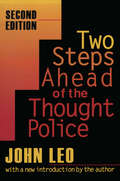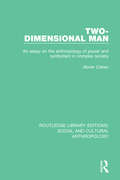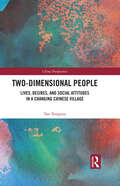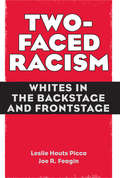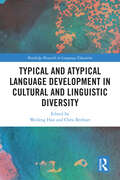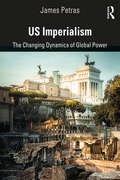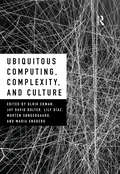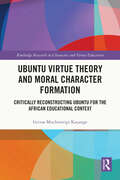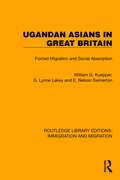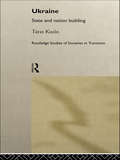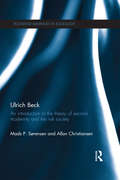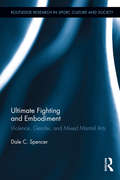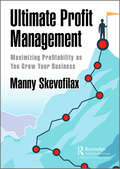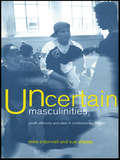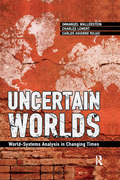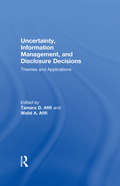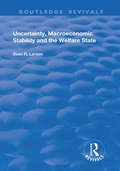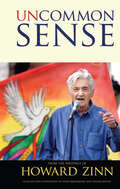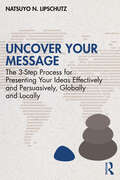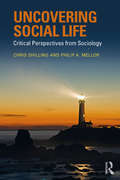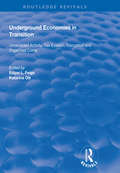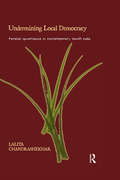- Table View
- List View
Two Steps Ahead of the Thought Police
by John Leo"A satirist in the tradition of Mark Twain and H.L. Mencken, John Leo has been long entertaining his readers by pillorying the worst excesses of the Political Correctness movement while lifting high the standard of common sense. This collection of editorials is Leo at his best-bitingly funny and with a keen moral edge."-Relgion and Liberty
Two-Dimensional Man: An Essay on the Anthropology of Power and Symbolism in Complex Society (Routledge Library Editions: Social and Cultural Anthropology)
by Abner CohenCentral to this original study, first published in 1974, is that Political Man is also Symbolist Man, that man is two-dimensional. The book explores the possibilities of the systematic study of the dialectical interdependence between power relationships and symbolic action in modern, complex society. The discussion focuses on the processes by which interest groups, that cannot organise themselves formally, manipulate different types of symbolic formations to articulate a number of basic organisational functions: distinctiveness, communication, decision-making, authority, ideology and socialisation. The analysis is worked out in terms of specific case studies of different types of groupings, or ‘invisible organisations’ – ethnic, elitist, religious, ritually secret, cousinhood – which go through processes of cultural metamorphosis, shifting from one symbolic strategy to another, in response to changes in their circumstances. In conclusion, the discussion is brought to bear on the study of stratification in large-scale industrial society generally.
Two-Dimensional People: Lives, Desires, and Social Attitudes in a Changing Chinese Village (China Perspectives)
by Tan TongxueBased on almost eight years of fieldwork in a town and a village in South China, this book analyzes contradictions among various dimensions of the peasant economy, social relationships, popular religion, and local politics in rural China. Compared to many anthropological, sociological, and political studies of rural China, which regard Chinese peasants as one-dimensionally materialistic, politically conservative, egocentric (lacking public-mindedness, as in anthropologist Yan Yunxiang’s notion of the "uncivil individual"), with collapsed beliefs, and thinking only of the present (or the "today-ness of today" according to anthropologist Liu Xin), this book shows that people in contemporary rural China are actually "two-dimensional": trying to combine the calculation of self-interest with affective networks of reciprocity, but often falling into awkwardness or cynicism, in a paradoxical symbiosis between nihilism and transcendence. While Marcuse used the words of Benjamin to analyze "one-dimensional man," writing "Only for the sake of the hopeless ones have we been given hope," this book writes of two-dimensional people, "Only when the vast majority of ordinary people can find hope in everyday life can we finally be given hope!" This book will be of interest to scholars and students of Sociology, Anthropology and East Asian Studies. It will also be a great read to those who are interested in contemporary China in general.
Two-Faced Racism: Whites in the Backstage and Frontstage
by Joe Feagin Leslie PiccaTwo-Faced Racism examines and explains the racial attitudes and behaviours exhibited by whites in private settings. While there are many books that deal with public attitudes, behaviours, and incidences concerning race and racism (frontstage), there are few studies on the attitudes whites display among friends, family, and other whites in private settings (backstage). The core of this book draws upon 626 journals of racial events kept by white college students at twenty-eight colleges in the United States. The book seeks to comprehend how whites think in racial terms by analyzing their reported racial events.
Typical and Atypical Language Development in Cultural and Linguistic Diversity (Routledge Research in Language Education)
by Weifeng Han and Chris BrebnerTypical and Atypical Language Development in Cultural and Linguistic Diversity brings together state-of-the-art studies in both typical and atypical language development. Placing the topic in the context of cultural and linguistic diversity (CALD), the book offers readers serious theoretical consideration of the topic and provides implications for multilingual educational and clinical practices. The content covers a wide range of topics related to multilingual language development in CALD: typical and atypical language development in CALD, and the interface between both; the relationship between multilingual competence and academic performance in CALD; providing unbiased speech and language measures in CALD; and heritage and minority languages education in CALD. Each chapter outlines the core theoretical and practical issues and explores both theoretical and pedagogical/clinical implications in the area and possible future developments. This volume is an essential resource for all those who study, research, or are interested in multilingual development, educational linguistics, and clinical linguistics in the CALD context.
U.S. Healthcare and the Future Supply of Physicians
by Eli Ginzherg Panes MinogiannisMany different sectors of modern society influence the nation's healthcare system. Government, health insurance companies, managed care organizations, academic health centers, the pharmaceutical industry, and other groups all affect healthcare. In the areas of medical access, cost, and quality, the physician remains the key to the efficiency and effectiveness of healthcare services. Eli Ginzberg and Panos Minogiannis, in Ginzberg's final book, examine the supply of health personnel in the United States. They consider the ways it has been influenced by federal and state legislation, healthcare financing, the transformation of the hospital, managed care, and health trends in the last part of the twentieth century. Through this historical approach, the book identifies key moments in U.S. health policy history that have led to problems in the geographical distribution of medical personnel, gender and race representation in the health personnel pool, and subsequent attempts to resolve these problems. This volume pays special attention to current trends in healthcare and tries to forecast the direction of the debate over health personnel supply in the coming years. Chronic care conditions and the ageing of the population on the one hand and the penetration of managed care and the subsequent transformation of American hospitals on the other converge to present policymakers with tremendous challenges in financing healthcare. Ginzberg and Minogiannis argue that a more balanced production and distribution of U.S. health personnel will go far in easing the financial burden of healthcare and at the same time improve the quality of services provided to the American people.
UK Hip-Hop, Grime and the City: The Aesthetics and Ethics of London's Rap Scenes (Routledge Advances in Ethnography #14)
by Richard BramwellYoung people in London have contributed to the production of a distinctively British rap culture. This book moves beyond accounts of Hip-Hop’s marginality and shows, with an examination of the production, dissemination and use of rap in London, how this cultural form plays an important role in the everyday lives of young Londoners and the formation of identities. Through in-depth interviews with a range of leading and emerging rap artists, close analysis of rap music tracks, and over two years of ethnographic research of London’s UK Hip-Hop and Grime scenes, Bramwell examines how black and white urban youths use rap to come together to explore their creative abilities. By combining these methodological approaches in the development of a critical participant observation, the book reveals how the collaborative work of these urban youths produced these politically significant subcultures, through which they resist unfair and illegitimate policing practices and attempt to develop their economic autonomy in a city marred by immense social and economic inequalities.
US Imperialism: The Changing Dynamics of Global Power (Studies In Critical Social Sciences / Critical Global Studies #83/6)
by James PetrasThis book offers a broad and deep examination of the dynamics of US imperialism. Petras analyzes imperialism not only as economic domination, showing that its impact in the world takes many forms, including cultural, political and historical. He points to the disruptive effects it has on other world regional economies and cultures. Capitalism and imperialism take diverse forms but both are intimately tied to the projection of state power in the service of capital—a strategy designed to advance the geopolitical and economic interests of the US economic elite and ruling class—interests that are equated with the 'US national interest'.
Ubiquitous Computing, Complexity and Culture
by Jay David Bolter Ulrik Ekman Lily Diaz Morten Sondergaard Maria EngbergThe ubiquitous nature of mobile and pervasive computing has begun to reshape and complicate our notions of space, time, and identity. In this collection, over thirty internationally recognized contributors reflect on ubiquitous computing’s implications for the ways in which we interact with our environments, experience time, and develop identities individually and socially. Interviews with working media artists lend further perspectives on these cultural transformations. Drawing on cultural theory, new media art studies, human-computer interaction theory, and software studies, this cutting-edge book critically unpacks the complex ubiquity-effects confronting us every day. The companion website can be found here: http://ubiquity.dk
Ubuntu Virtue Theory and Moral Character Formation: Critically Reconstructing Ubuntu for the African Educational Context (Routledge Research in Character and Virtue Education)
by Grivas Muchineripi KayangeThis book investigates the ubuntu theory-based conception of virtue and moral character formation in the northern, western, and eastern regions of Africa, suggesting a critical reconstruction of ubuntu by conceptualising the four different forms of practices in moral character formation. Arguing for the critical reconstruction of ubuntu virtue theory as more nuanced than simply the standard ubuntu normative virtue theories (which give priority to the community as the sole locus for understanding virtues and character formation in Africa), the book builds a comprehensive model of virtue and moral character formation that draws insights from the reconstructed notion of ubuntu and other theories within and beyond the African thought. Chapters feature experience from across Africa including Malawi, Zambia, Zimbabwe, Uganda, Kenya, and South Africa, and centre on topics such as traditional cultural views and practices, political systems in various nations, neoliberalist thought, and primary, secondary and tertiary education systems in Africa and further afield. This is a valuable resource for scholars, academics, and postgraduate students, working in the fields of moral and values education, philosophy of education, and the theory of education more broadly. Those also interested in educational psychology may also find the volume of interest.
Ugandan Asians in Great Britain: Forced Migration and Social Absorption (Routledge Library Editions: Immigration and Migration #20)
by William G. Kuepper G. Lynne Lackey E. Nelson SwinertonUgandan Asians in Great Britain (1975) examines the impact of the 1972 immigration of 28,000 Asians expelled from Uganda, looking at the impact on both the immigrants themselves and the British host community. It is an attempt to understand some of the dynamics of forced migrant transition from one society and culture to another. The study was largely carried out in Wandsworth and Slough and shows how these communities – not without social problems before this influx of immigrants – adapted to the new arrivals. The sensitivity and effectiveness of the community relations organisations and the welfare agencies in these areas is revealed.
Ukraine: State and Nation Building (Routledge Studies of Societies in Transition #No.9)
by Taras KuzioUkraine: State and Nation Building explores the transformation of Soviet Ukraine into an independent state and examines the new elites and their role in the state building process, as well as other attributes of the modern nation-state such as borders, symbols, myths and national histories. Extensive primary sources and interviews with leading members of Ukranian elites, show that state building is an integral part of the transition process and cannot be divorced from democratization and the establishment of a market economy.
Ulrich Beck: An Introduction to the Theory of Second Modernity and the Risk Society (Routledge Advances in Sociology)
by Allan Christiansen Mads SørensenSince the 1980s, Ulrich Beck has worked extensively on his theories of second modernity and the risk society. In Ulrich Beck, Mads P. Sørensen and Allan Christiansen provide an extensive and thorough introduction to the German sociologist’s collected works. The book covers his sociology of work, his theories of individualization, globalization and subpolitics, his world famous theory of the risk society and second modernity as well as his latest work on cosmopolitanism. Focusing on the theory outlined in Beck’s chief work, Risk Society, and on his theory of second modernity, Sørensen and Christiansen explain the sociologist’s ideas and writing in a clear and accessible way. Largely concerned with the last 25 years of Beck’s authorship, the book nevertheless takes a retrospective look at his works from the late seventies and early eighties, and reviews the critique that has been raised against Beck’s sociology through the years. Each chapter of Ulrich Beck comes with a list of suggested further reading, as well as explanations of core terms. The book also includes a biography of Beck, and full bibliographies of his work in both English and German. This comprehensive introduction will be of interest to all students of sociology, contemporary social theory, globalization theory, environmental studies, politics, geography and risk studies.
Ultimate Fighting and Embodiment: Violence, Gender and Mixed Martial Arts (Routledge Research in Sport, Culture and Society)
by Dale C. SpencerMixed martial arts (MMA) is an emergent sport where competitors in a ring or cage utilize strikes (punches, kicks, elbows and knees) as well as submission techniques to defeat opponents. This book explores the carnal experience of fighting through a sensory ethnography of MMA, and how it transgresses the cultural scripts of masculinity in popular culture. Based on four years of participant observation in a local MMA club and in-depth interviews with amateur and professional MMA fighters, Spencer documents fighters' training regimes and the meanings they attach to participation in the sport. Drawing from the philosophical phenomenology of Martin Heidegger, Maurice Merleau-Ponty and Jean-Luc Nancy, this book develops bodies-centered ontological and epistemological grounding for this study. Guided by such a position, it places bodies at the center of analysis of MMA and elucidates the embodied experience of pain and injury, and the sense and rhythms of fighting.
Ultimate Profit Management: Maximizing Profitability as You Grow Your Business
by Manny SkevofilaxThroughout the author’s career as a banker and business consultant, he has seen many examples of businesses that were doing just “fine.” They were profitable and growing slowly but surely, but then, the business owner decided that it wasn’t enough anymore to simply grow slowly. What was suddenly needed was growth of 20%, 50%, or even 100% per year, just like the notable companies they see and hear about every day in the media. They began to try to grow the business and in a short period, a profitable and thriving business became unprofitable. Since the business was no longer profitable, it needed to take on debt to pay its expenses. After taking on more and more debt, the business reached a point where it could not find any more debt to take on. This circumstance caused the business to fail to pay its bills anymore which led to a financial day of reckoning.It doesn’t have to be this way. There is a more effective way to grow your business without causing it to become unprofitable. And that’s why the author wrote this book.Growing a business without making profits usually leads to a short lifespan for that business and there are exceptions such as Uber and DoorDash – but there is a big difference between a business that has outside investors (angel investors, private equity, and venture capital and the typical small business entrepreneur trying to bootstrap a business. The difference is that if a business has a huge target market and it is growing its sales rapidly, outside investors may be willing to fund losses for a period. The same does not apply to an entrepreneur trying to grow a business without outside investors. Losses show that a business is on borrowed time. Once your capital is exhausted, there is no going back. A business needs profits to remain viable and to be able to provide for its owners, its employees, and its community. Running a business that loses money will put you out of business.There is no reason not to be profitable as you grow your business! The author shares the lessons that were taught to him by leaders, mentors in business, and by his clients. What took him by surprise was that these lessons were not complicated. They’re simple. They use simple, uncomplicated methods to grow their businesses profitably. You will learn about the readily available tools you can use to ensure that your business does not turn unprofitable as you grow it. You’ll be convinced that it makes sense to resist the lure of the high-growth, no-profit strategy and instead embrace the approach of steady growth with profits.Use this book as a guide. In it, the author covers the most important aspects of reasonable, prudent growth that will avoid debt and allow you, your partners, and business associates a productive and non-stressful existence with a business that grows and profits correctly.
Unbroken Homes: Single-Parent Mothers Tell Their Stories
by J Dianne Garner Wendy A PatersonExplore the real-life triumphs and tragedies of single-parent mothers!Unbroken Homes is a “story quilt” of personal narratives constructed from in-depth, case study interviews of five single-parent mothers. The book chronicles their journeys as mothers, daughters, and women, in relationships and in solitude, displaying their stories in their own words like the squares of a multicolored quilt. Unbroken Homes breaks through the stigma associated with “broken homes” and provides a new perspective on the reorganization of American families.Unbroken Homes encourages you to rethink some damaging stereotypical assumptions about children from single-mother headed homes. Drawing information from family research, counseling, and a cross-section of social sciences, this book is pertinent to any professional who works with single parents or their children. Unbroken Homes does not deal with what is “typical” in the single-parenting experience, nor does it give advice or proselytize. Rather, its purpose is to discover the meaning that single-parent mothers bring to their own lives, helping you to understand the dynamics of single-parent families from a uniquely personal perspective.In Unbroken Homes you will witness the ways that these women: experience the ill effects of gender role socialization work to overcome stigma redefine ideals for family life and gender expectations balance responsibilities in and outside of their homes stretch finances to meet the needs of their families regain strength and self-confidence encourage their children's development affirm the strength of their families cope with depression develop networks of supportThis intensely personal collection of women's stories and reflections is a must read for everyone who seeks a better understanding of divorce, single-parenting, and being alone, from an insider's perspective.
Uncertain Masculinities: Youth, Ethnicity and Class in Contemporary Britain
by Sue Sharpe Mike O'DonnellIn this era of rapid and unsettling change, boys now more than ever face difficulties in establishing their self-image and status. In this original and challenging study Mike O'Donnell and Sue Sharpe explore how teenage boys from white, African-Caribbean and Asian backgrounds negotiate contemporary uncertainties to construct their gender identities.Drawing theoretical insights about how class, race and ethnicity critically affect the formulation of masculinities throughout, the authors examine:* the discrepancies between boys and girls' attitudes and expectations* the split between boys' formal acceptance of politically correct ideas and their informal behaviour amongst the peer group* boys' leisure pursuits including involvement in illegal activities and their selective identification with global youth culture.Uncertain Masculinities is a fascinating account of the complexity of contemporary boys' identities and will be of use to students of the sociology of youth and of gender studies.
Uncertain Worlds: World-systems Analysis in Changing Times
by Charles C. Lemert Immanuel Wallerstein Carlos Aguirre RojasUncertain Worlds is the definitive presentation of the evolution of world-systems analysis from the point of view of its founder, Immanuel Wallerstein. Few theorists have offered a more systematic theory of what has become known as 'globalisation' than Wallerstein. The book includes a one-of-kind interview with Wallerstein by Carlos Rojas, a conversation between Wallerstein and Lemert about the history of the field as it has come down to the present time, a long essay by Lemert on the uncertainties of the modern world-system, as well as a preface by Rojas and a concluding essay by Wallerstein. No other book lends such biographical, historical, and personal nuance to the biography of world-systems analysis and, thus, to the history of our times. The will be a key reference book for students of global politics, economics and international relations.
Uncertainty, Information Management, and Disclosure Decisions: Theories and Applications
by Walid Afifi Tamara AfifiThis volume integrates scholarly work on disclosure and uncertainty with the most up-to-date, cutting edge research, theories, and applications. Uncertainty is an ever-present part of human relationships, and the ways in which people reduce and/or manage uncertainty involves regulating their communication with others through revealing and concealing information. This collection is devoted to collating knowledge in these areas, advancing theory and presenting work that is socially meaningful. This work includes contributions from renowned scholars in interpersonal uncertainty and information regulation, focusing on processes that bridge boundaries within and across disciplines, while maintaining emphasis on interpersonal contexts. Disciplines represented here include interpersonal, family, and health communication, as well as relational and social psychology. Key features of the volume include: comprehensive coverage integrating the latest research on disclosure, information seeking, and uncertainty, a highly theoretical content, socially meaningful in nature (applied to real-world contexts), an interdisciplinary approach that crosses sub-fields within communication. This volume is a unique and timely resource for advanced study in interpersonal, health, or family communication. With its emphasis on theory, the book is an excellent resource for graduate courses addressing theory and/or theory construction, and it will also appeal to scholars interested in applied research.
Uncertainty, Macroeconomic Stability and the Welfare State (Routledge Revivals)
by Sven R LarsonThis title was first published in 2002: This monograph sets out to model a macroeconomy that is inherently unstable because of qualitative - or Keynesian - uncertainty. By modelling a macroeconomic theory, this approach to fixed or sticky prices also investigates the link between uncertainty, sticky prices, and macro-stability - by suggesting that such prices improve economic activity rather than impeding it.
Uncommon Sense: From the Writings of Howard Zinn (Series in Critical Narrative)
by Howard Zinn Dean Birkenkamp Wanda RhudyWhy Howard Zinn has become one of the most important and influential American historians is perhaps nowhere more evident than in this new book. Few social critics have been as inspiring as the ever-hopeful Zinn and, unlike many historians, Zinn turns historical details toward deeper observations on the universal truths and struggles of humankind. His remarkable wisdom and insight can be found in his earliest writings through his latest essays, speeches, and plays. Uncommon Sense brings together his most poignant and profound quotations from decades of writing and speaking. The book reveals the philosophical side of Howard Zinn and a consistency of vision over 50 years on topics ranging from government to race, history, law, civil disobedience, and activism. Offering quotations of universal and timeless quality, the book shows why history will regard this historian as a political and moral philosopher in the company of Paine, Jefferson, Frederick Douglass, and Martin Luther King Jr.
Uncover Your Message: The 3-Step Process for Presenting Your Ideas Effectively and Persuasively, Globally and Locally
by Natsuyo N. LipschutzWritten by a non-native English-speaking professional speaker with over 20 years of international consulting experience, this book lays out a step-by-step process to improve cross-cultural communication skills and achieve a strong global presence.Every year, organizations lose money, time, and people due to poor or inefficient cross-cultural communication – and this can be as easily between departments or individuals within an organization as across oceans. To tackle this widespread problem, Natsuyo N. Lipschutz developed the 3-step process she calls the “3As” (Acknowledge, Analyze, Adapt), using a unique multilayered approach: cross-culture × logical thinking × storytelling. Using the 3As process, readers will improve their awareness of cultural differences and learn analytical and logical thinking skills to zero in on their own unique message, tell persuasive stories, and ultimately get their messages not only clearly heard but acted upon in a culturally diverse global business environment.Filled with lessons and real-life stories from global companies and executives who benefited from Natsuyo’s guidance, this book will appeal to any business leader who needs to communicate with a diverse range of stakeholders, whether in a different country or a different team, to persuade and succeed.
Uncovering Social Life: Critical Perspectives from Sociology
by Chris Shilling Philip A. MellorIn an era when rapid social change, the disappearance of traditional communities, the rise of political populism and the threat posed by radical religious movements makes it appear that ‘all that is solid melts into air’, the classical sociological problem of how peaceable societies can be created and maintained assumes renewed urgency. Uncovering Social Life: Critical Perspectives from Sociology explores how contemporary institutional changes erode existing social relationships and identities but also create space for opposition to, or creative adaptation of, these broader shifts. Exploring the threats and opportunities associated with the contemporary age, this book identifies how sociology helps us understand the problems associated with social order and change before focusing on the most important institutional transformations to have occurred in: bodies and health; sex, gender and sexuality; employment; finance; the Internet and new social media; technology and artificial intelligence; religion; governance and terrorism. After a critical introduction placing these issues in their historical and sociological context, theoretical chapters analysing how sociology views the individual/society relationship, and the volatile processes endemic to the modern era, provide an innovative and comprehensive context for these explorations. This book provides a clear and engaging account of social life. Covering a broad range of sociological topics, the diverse chapters are united in a concern with three major themes: the growing complexity of the current era, and the ‘doubled’ identities with which it is associated; the opportunities and constraints such developments pose to different groups; and the capacity of institutional changes to both erode existing social relationships, and create space for the emergence of new collective identities that oppose these structural shifts.
Underground Economies in Transition: Unrecorded Activity, Tax Evasion, Corruption and Organized Crime (Routledge Revivals)
by Edgar L. Feige Katarina OttPublished in 1999, this work examines the crucial role played by unofficial and underground activities in the transitional economies of Central and Eastern Europe and new independent states. Countries undergoing radical transformations from socialism to capitalism experience fundamental changes in institutional rules governing property rights, government regulations, taxation and the appropriate conduct of public service. Underground and unofficial activities represents non-compliant economic behaviours involving evasion, avoidance, circumvention, abuse and/or corruption of the institutional rules as well as efforts to conceal these illicit behaviours from the view of public authorities. The book employs the conceptual framework of the new institutional economics to elaborate the theoretical relationship between underground activities and overall performance of transition economies. The social, cultural and economic causes of unofficial activities are examined as well as their consequences for economic policy and performance. Policy issues include the relationship between tax evasion and corruption, the underground economy and organized crime, state and regulation, and methods and consequences of legalization of the underground economy.
Undermining Local Democracy: Parallel Governance in Contemporary South India
by Lalita ChandrashekharFocusing on Karnataka in India, this study examines the implications of the model of development sought to be introduced in the entire country through the governance reforms of the post-1991 period — a model that bypasses Panchayat Raj institutions (PRIs), resulting in a majority of the population being left outside the purview of development. These changes in governance resulted in, among other things, the prolific growth of NGOs in the country, particularly in Karnataka. Explaining how community-based organizations (CBOs) set up by these NGOs have made their way into rural Karnataka, this book expresses concern over how they now perform functions that rightly belong to PRIs following the 73rd Amendment to the Constitution which devolves 29 functions to local self-government, passing on the funds they receive from the centre to their district and village branches, though these should actually go to PRIs. The book argues that elected representatives have been put in place by the people at all levels, and it is they who should take decisions regarding the development of this country. In the post-liberalisation period, governance through institutions that eschew political decentralisation is fraught with hazards. Not only will avenues for the expression of people’s wishes be lacking in such a scenario, but there will also be increasing inequality, resulting in a skewed development. The inclusiveness which the present government seeks will elude them unless they restore and strengthen Panchayat Raj institutions.
